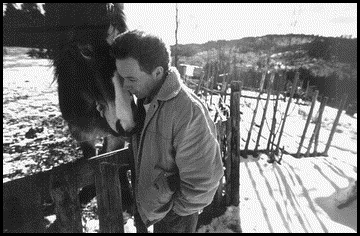A Novel
Per Petterson
Don Bartlett, Translator
(Graywolf Press)

He may have some reason to hate the old man. Sletten père has been known to slam Audun (and his younger brother Egil) around, usually with little or no good reason. This is what happened when Audun, ten, and Egil, eight, had just came back from their secret fishing trip:
- "Where've you been so early, Egil."
"We've been playing cards at Frank's house."
"You don't say. And you dropped the cards in the swimming pool, did you, and you had to wade in after them."
Egil laughed. "Frank hasn't got a swimming pool, you know that."
"Wow, you don't say? Where the hell have you been fishing then?" my father said and hurled Egil against the wall. I felt the thump through my whole body and Egil was winded, he turned white and then he began to sob.
"Now watch carefully, Egil," my father said ... the minute I turned around, my father's hand came out of nowhere and hit my face. I was knocked backwards and my cheek went numb.
This casual violence pervades It's Fine by Me, gives a foundation to a boy's sullen anger, his unwillingness to open up to anyone, his casual self-destructive out-of-nowhere actions.
It also explains brother Egil's own tragedy when he turns sixteen. He leaves to live with his sister Kari and brother-in-law (who Audun calls "James Dean"):
- Egil went with them up to the country to help unload the truck and have a look at the place where he might be working. He didn't come back. Two days later he drove one of James Dean's Volvo Amazons into the river Glomma and drowned.
Another father-brutalizing-child story, no?
Well, no. For Petterson being Petterson, the plate is a lot fuller. Father is a monster and we are shown how living with such a monster might queer everything. Mother fades out, then starts drinking in the early daylight hours. Audun is an impossibly incommunicative juvenile. Egil is in the grave.
Such is Petterson's art that we buy into it all, are struck by his elegant way of making everything believable and all unutterably sad. As with all of Petterson's stories --- at least the three novels I've gone through --- we see men and women and families gone mad and wrong, people locked in an inarticulate trap of frozen words, frozen deeds, inexplicable feelings. When he is thirteen years old Audun runs away from home, ends up with a kindly family out in the Norwegian countryside. First day, as he meets Leif the father, Leif says "Well, there's the boy with the white bum."
- I stood up from the table, there was no other door into the room, and the window looked as if it hadn't been opened for years, and then I edged around the table and started to run towards him. It was like running into a brick wall. He was rock-hard. He let go of the stick and grabbed me round one shoulder, held my hair and looked me straight in the eye. He didn't blink, and his eyes were the brilliant blue of a child.
"Hello there, you young billy goat," he smiled. "What I meant to say was that if it hadn't been for your bum I would never have seen you. I was in the Volvo, and suddenly I saw something white by the river that wasn't there before, so of course I had to stop. You didn't look too clever, I can tell you."
- He let go of my hair and stroked my cheek, and his hand was huge and dry and rough as the rock it resembled, and I stood quite still, and then I couldn't hold back, and I started to cry. The tears came from everywhere in floods, and he gently pushed me back into the kitchen.
In a paragraph, the author has given us a look into the heart of Audun. Being thirteen he would be extremely shy about anyone --- especially a total stranger --- talking about his "bum." He tries to escape, but runs into a huge kind man, one who kindly strokes his cheek. Since Audun has known nothing but violence from adult males, this gentleness clobbers him, brings on a fit of weeping.
Throughout It's Fine by Me, Audun shows anger, hate, a vile temper, and, mostly, a fabricated indifference. He does show the gentleness of tears twice, though: here with Leif; and again, at the very end, at his father's funeral.
In the last issue of RALPH, we complained about a book about growing up in the slums of Dublin. It was crammed with a step-father's violence on his daughter. It went on, page after page, chapter after chapter.
We gave up half-way through it, because we (and the six- or seven- or eight-year-old Martha) were subject to an endless series of blows, hurlings, whippings, kickings, slammings, hair pullings, death threats, bashings and finally mindless rape from the step-father and from his friends.
We wrote that the writer was guilty not only of Martha abuse but of "reader abuse," for the author seemed to revel in non-stop violence.
It's instructive to compare this to the brutality in It's Fine by Me. We see Audun and his brother worked over by the father a couple of times, while several others are only hinted at. But the very paucity of cruelty seems to double the gut-crunching effect on the reader. It becomes all the more believable and all the more awful because it is delivered with such authorial restraint.
Petterson's book is wonderful and terrible at the same time: wonderful because instantly we see the adult force that makes a child crawl in himself and die; awful because everything cries out against this random sadism, a violence that should never be tolerated.